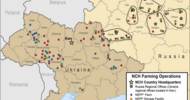China, Mozambique: old friends, new business
As China surges into Mozambique with sophisticated business relations and friendly aid, the former Portuguese colony's traditional Western patrons are humbled.
By Loro Horta for ISN Security Watch (13/08/07)China's phenomenal growth and the resultant need for raw materials and new markets has led Beijing to vigorously re-engage with Mozambique, and Africa in general.
China's relations with Mozambique date back to the 1960s when the PRC supported the Marxist-oriented FRELIMO party in its struggle for independence against Portuguese colonial rule. After independence in 1975 relations remain friendly albeit limited as the FRELIMO government moved closer to the far more powerful Soviet patron. The end of the Cold War saw China lose interest in the East African country as its focus shifted to domestic priorities and its immediate neighborhood.
In the past two years or so, China's involvement with Mozambique can be described as just short of meteoric. In 2004, two-way trade stood at US$70 million, reaching US$210 million in 2006.
While modest when compared with China's trade with other African states such as Angola and Sudan, two important aspects are worth noticing.
First is the fact that two-way trade tripled in only two years, making it one of the fastest growth rates experienced by any single nation's trade with China.
The second particularity lies in the fact that unlike China's trade with its major partners in the continent such as Nigeria, Angola and Sudan, its rising trade with Mozambique is not centered on raw material imports to the PRC, such as oil and natural gas. China's trade with Mozambique is dominated by imports of agricultural products, fisheries, forest products and investment in the service sector. In turn, Mozambique imports cheap manufactured goods and machinery from the PRC.
Chinese foreign direct investment (FDI) in the country remains modest when compared with investments from South Africa, Brazil and Portugal. In 2004, Chinese FDI stood at a mere US$500,000. However, by mid-2007, it reached US$12 million, making China the sixth largest source of FDI for Mozambique.
As with the trade statistics, at first glance the overall numbers seem to be of no particular consequence; however if one takes into account that Chinese FDI grew 24-fold in two years it becomes clear that Chinese involvement in Mozambique is surging.
As of 2006, China was Mozambique's third major trading partner accounting for 5 percent of its imports and 4.7 percent of its exports. This is quite significant when considering that as recent as 2003 the PRC was not even among the country's top 10 trading partners.
To further bilateral trade relations between the two countries, earlier this year the Chinese government increased the number of Mozambican products exempt of tariffs for export to the mainland from 190 to 442. Other goodwill gestures included the writing off of nearly 70 percent of the country's debt to China (US$22 million) in 2001 and a further pardon of US$30 million this year.
Another area in which Beijing's rising influence is clearly visible is in the provision of soft loans for major infrastructure projects. In 2006, China granted Mozambique a US$2.3 billion loan for the construction of a mega dam in Mphanda Nkuwu in central Mozambique. It was Mozambique's single biggest foreign loan to date and perhaps the one with the easiest repayment terms. China has expressed its interest in funding a further 10 medium to small dams throughout the country. Further loans were given earlier this year, including a US$60 million loan from China's state-owned Exibank and a preferential line of credited of US$240 million for infrastructure projects granted by the central government.
Still, in the near term it may be in the agricultural sector where China's influence will be the greatest. In 2006, Beijing and Maputo signed a memorandum of understanding concerning the creation of a massive agricultural project in the Zambezi river valley area. Under this agreement, as many as 20,000 Chinese settlers may move into the valley to run large- to medium-scale farms destined to supply the ever more affluent Chinese market. If this project is implemented, it would most certainly make Mozambique's primarily agricultural-based economy highly dependent on China and make Beijing the dominant external player in the country.
Beijing's interest in the agriculture sector was further demonstrated when early this year it announced its willingness to fund the creation of an agricultural science research institute dedicated to improving crop production and quality.
With the increase in labor costs in a wealthier China, Mozambique with its cheap labor force, is becoming an attractive alternative for Chinese companies bent on cutting production costs. China's IT giant Lenevo is in the process of setting up a computer assembly plant and several textile factories have already relocated to the country. With this in mind, Chinese business interests have express their intention to build a major industrial park on the outskirts of the capital Maputo, similar to the one built in China's first special economic zones in the early 1980s.
The construction sector is another area where Chinese companies have been making headway. Chinese companies have won major contracts to upgrade Mozambique's major highway, estrada nacional numero 1 (national road No.1) the country's major rail line. Chinese state companies have also been involved in the expansion of Mozambique's major ports, and are diversifying into other smaller projects such office buildings, cheap housing and rural infrastructure.
Usually 50 to 70 percent cheaper than their local and foreign rivals, Chinese companies are putting many of them out of business. This has led to widespread accusations from indigenous business that Chinese companies make use of convict workers from the mainland in their projects. Other complaints include environmental illegalities such as widespread illegal logging and poaching. It should be noticed that many of the firms involved in such activities are not state owned and that other countries have been accused of similar infractions.
China's soft power
In order to minimize damage to bilateral relations from such incidents, Beijing has provided the Maputo government with very generous gifts. In addition to substantial soft loans, China has also provided extensive ajuda amigavel e gratuita (free and friendly aid). China has built various important government buildings free of charge, such as those housing the national parliament, the Foreign Ministry, the Joaquin Chissano conference center, a massive high-rise that houses members of Mozambique's defense force (FADM) and various other governmental buildings at the central and provincial levels.
China's latest gifts came early this year when it announced it would finance the construction of a new national stadium at a cost of US$15 million and provide the FADM with US$1.7 million in assistance.
In recent years, China has also sent large numbers of professionals to Mozambique as part of its assistance program, including doctors and nurses, engineers, agriculture specialists and teachers.
The number of Chinese nationals in Mozambique varies from source to source. The Chinese embassy in Maputo puts the number at 7,000 as of 2006, while Mozambican immigration authorities say the figure is closer to 12,000. Some nongovernmental organizations claim that the number maybe as high as 15,000 due to large numbers of Chinese illegal workers, particularly in the logging and mining business, mainly located in the country's remote northern provinces.
In the field of education, China offers the largest number of scholarships to Mozambican students. However, the difficult requirement of learning Chinese and the modest nature of the bursaries still makes South Africa, Portugal and Brazil the preferred destinations for Mozambique elites.
The extent of China's rising importance as a source of inspiration for FRELIMO's ruling elites can be seen in the decision taken by the Mozambican government in late 2006 to make mandarin a compulsory foreign language in high school in addition to English and French.
While Marxism Leninism is no longer important for either China or Mozambique, one should not underestimate the relevance of old friendships that tend to open doors otherwise closed to Western nations. Many senior Mozambican government officials were trained in China and still remember China's revolutionary solidarity in their fight for independence.
Conclusion
While trade and FDI statistics may not be extraordinary, the speed at which China has entrenched itself in all aspects of Mozambican life is impressive. The past two years have seen a surge of Chinese activity in the country, culminating this year with President Hu Jintao's visit to the former Portuguese colony. In a space of just two years, a country the size of Texas with a population of 21 million people and a robust economy, by African standards, has seen its traditional Western economic and political patrons humbled.
China's surge is also significant for it shows that the Chinese are no longer just crude and rapacious businessmen scavenging for raw materials, but that Beijing's economic relations with Africa are now becoming multidimensional and highly sophisticated, involving both competition and cooperation between the Chinese state and its private citizens.
Loro Horta is a research associate and a PHD candidate at the S. Rajaratnam School of International Studies, Nanyang Technological University, Singapore. He is also a graduate of the National Defense University of the Peoples Liberation Army (PLANDU).












